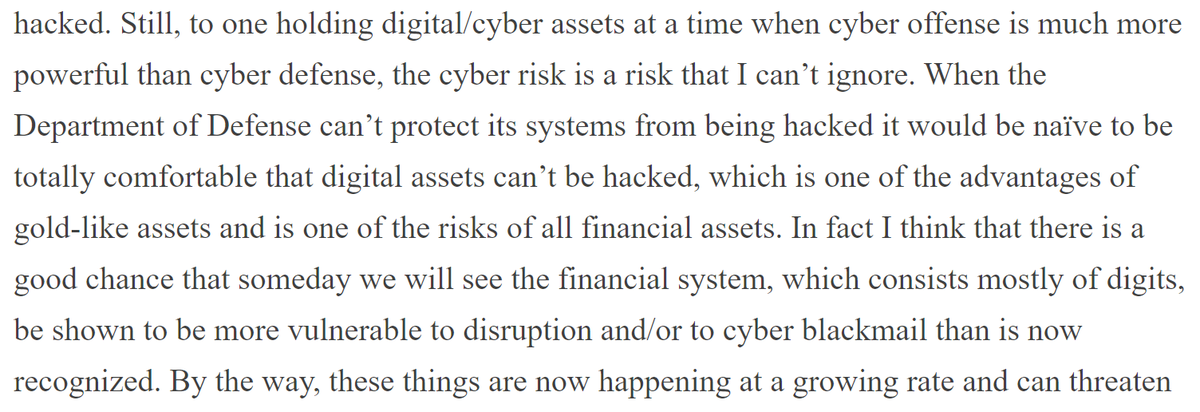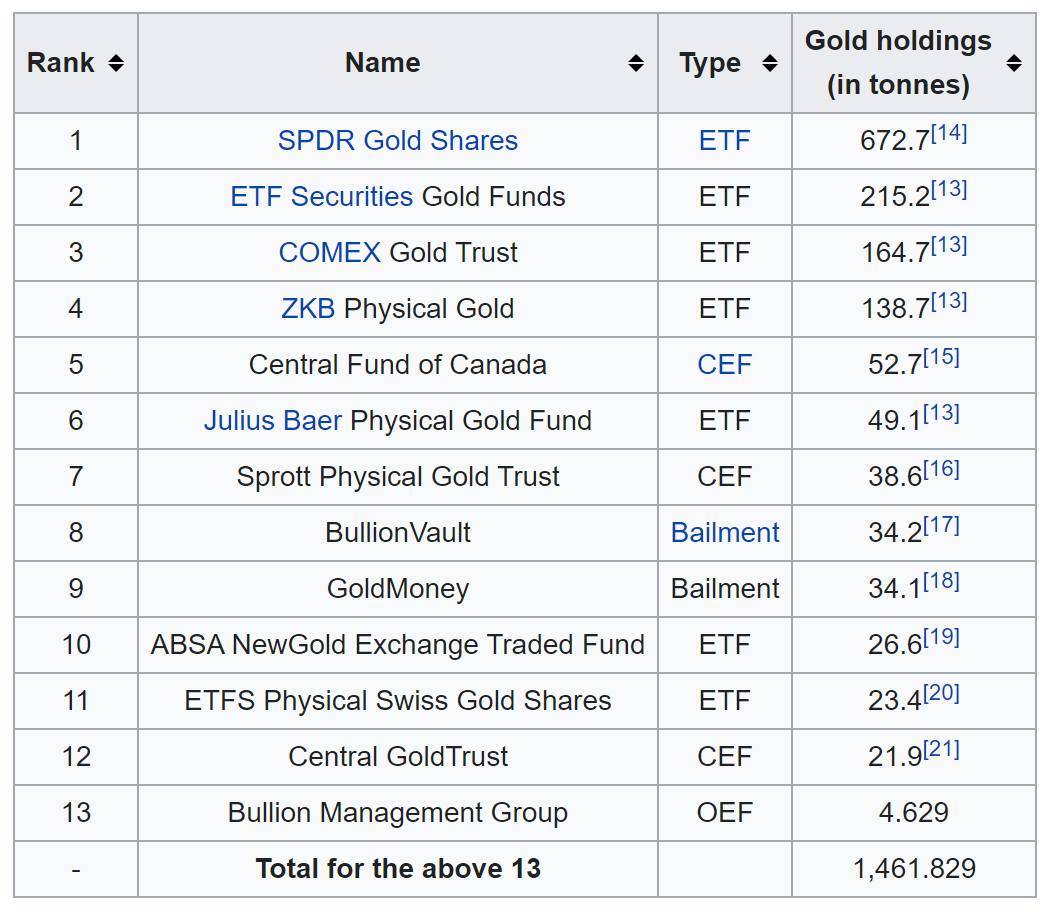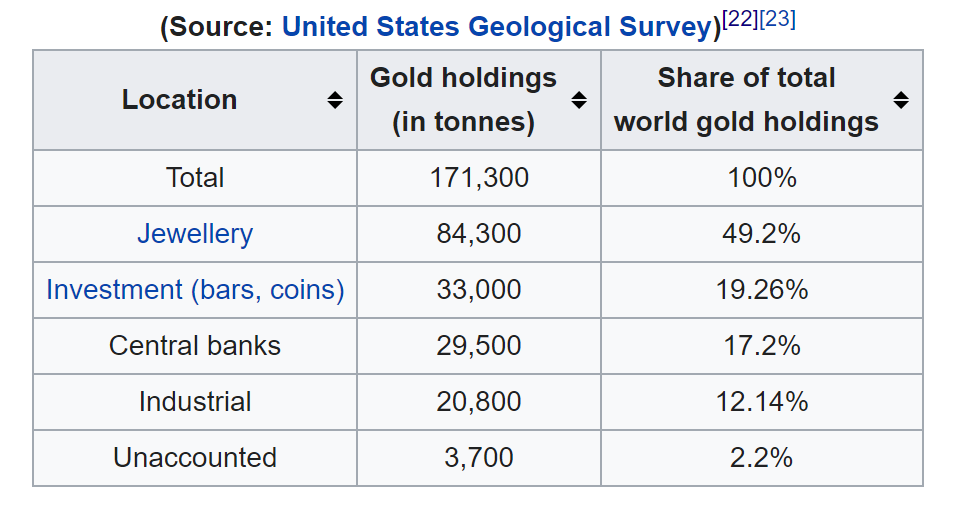
@RayDalio is one of the great investors of our time and he has begun thinking about #Bitcoin. He penned a thoughtful piece on his concerns about Bitcoin and was hoping to get responses, point-by-point.
Ray, here are my responses to your points (screenshotted) in a thread: 👇
Ray, here are my responses to your points (screenshotted) in a thread: 👇
https://twitter.com/RayDalio/status/1355224270759202816
Never in the history of the world had it been possible to transfer value between distant peoples without relying on a trusted intermediary, such as a bank or government - until 2009, with the invention of #Bitcoin.
You are correct in your summation of its significance, Ray.
You are correct in your summation of its significance, Ray.
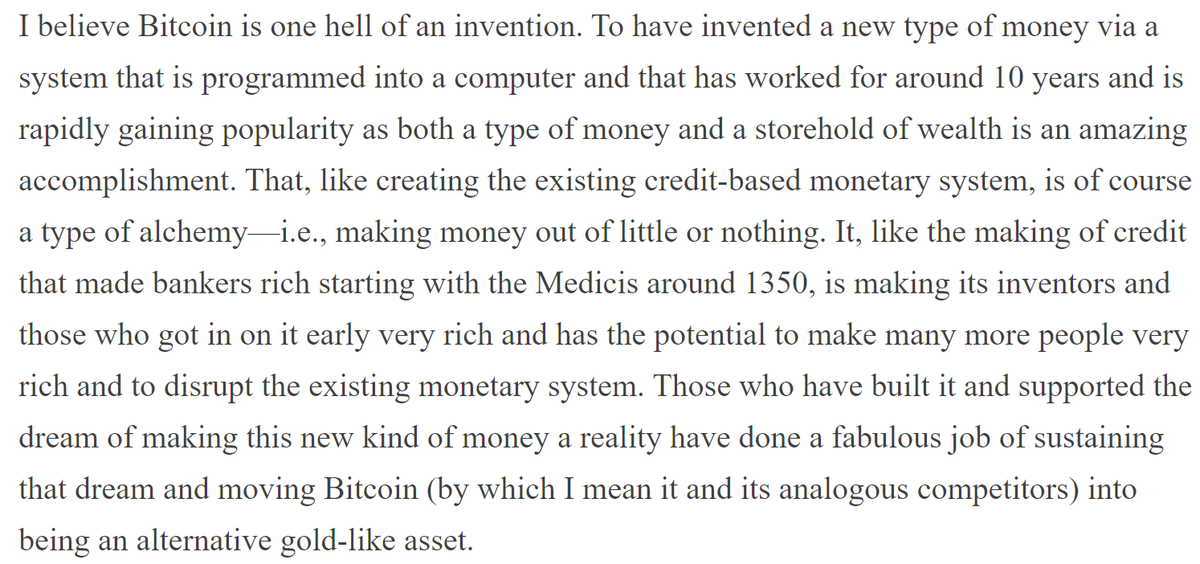
You ask what demand could #Bitcoin have and this is a deep question. It's not a complete answer but I will refer you to a thread on valuation frameworks for Bitcoin that I previously wrote:

https://twitter.com/real_vijay/status/1325961588633841664
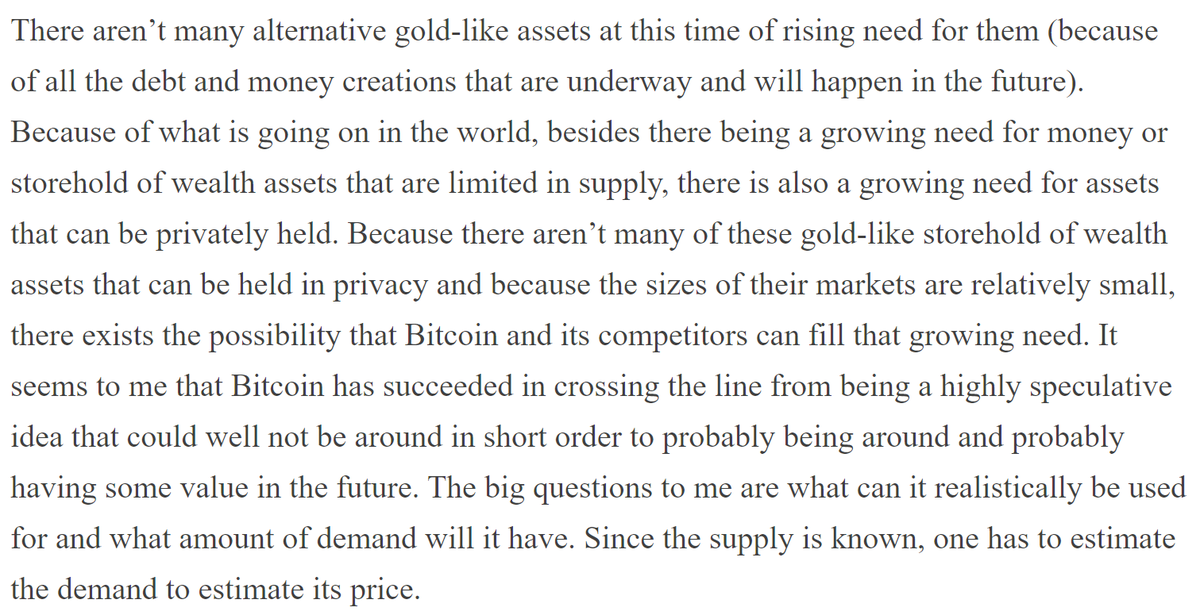
You suggest that while Bitcoin's supply may be limited the supply of cryptocurrencies is not limited and #Bitcoin may be supplanted by an arriviste. Response in subsequent tweets 
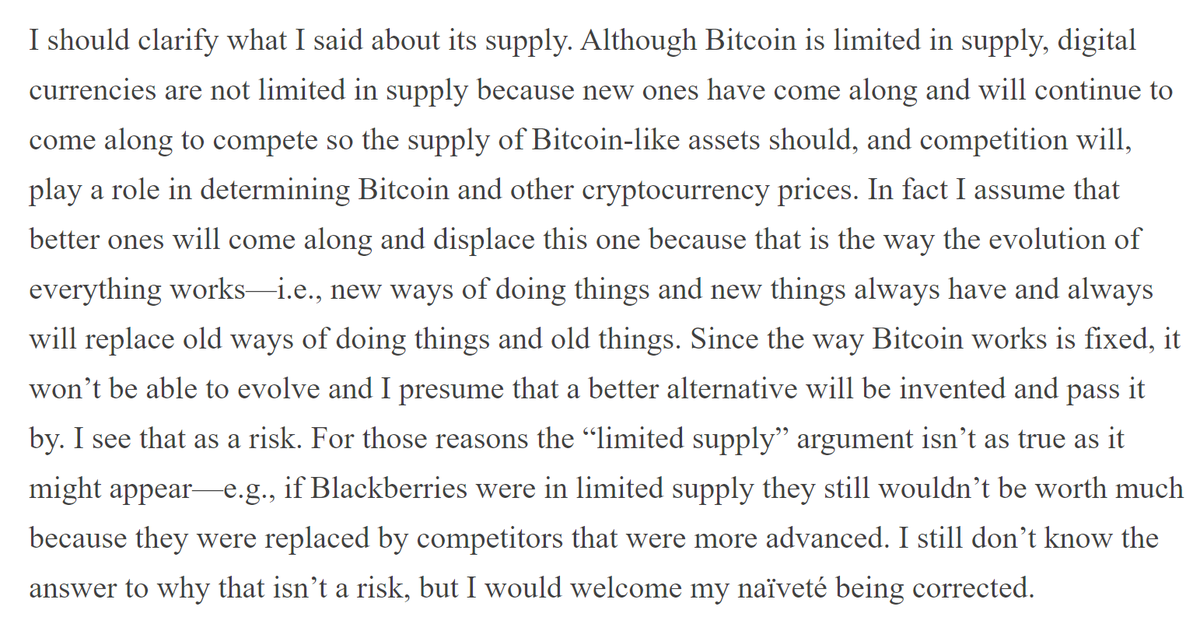
The fallacy in this argument is that the scores of #Bitcoin competitors that have been created over the years lack the “network effect” of the first and dominant technology in the space.
A network effect — the increased value of using #Bitcoin simply because it is already the dominant network — is a feature in and of itself. For any technology that possesses a network effect, it is by far the most important feature.
The network effect for Bitcoin encompasses the liquidity of its market, the number of people who own it, and the community of developers maintaining and improving upon its software and its brand awareness.
Large investors, including nation-states, will seek the most liquid market so that they can enter and exit the market quickly without affecting its price.
Developers will flock to the dominant development community which has the highest-caliber talent, thereby reinforcing the strength of that community. And brand awareness is self-reinforcing, as would-be competitors to Bitcoin are always mentioned in the context of Bitcoin itself.
It is important to distinguish between the hacking of the #Bitcoin protocol itself and hacking of computers to steal the private keys of individual owners of bitcoins. The protocol itself has been remarkably resilient and this is in large part due to Bitcoin's conservative design
I will quote from a classic 2011 piece on the design decisions built into #Bitcoin by @gwern:
gwern.net/Bitcoin-is-Wor…
gwern.net/Bitcoin-is-Wor…
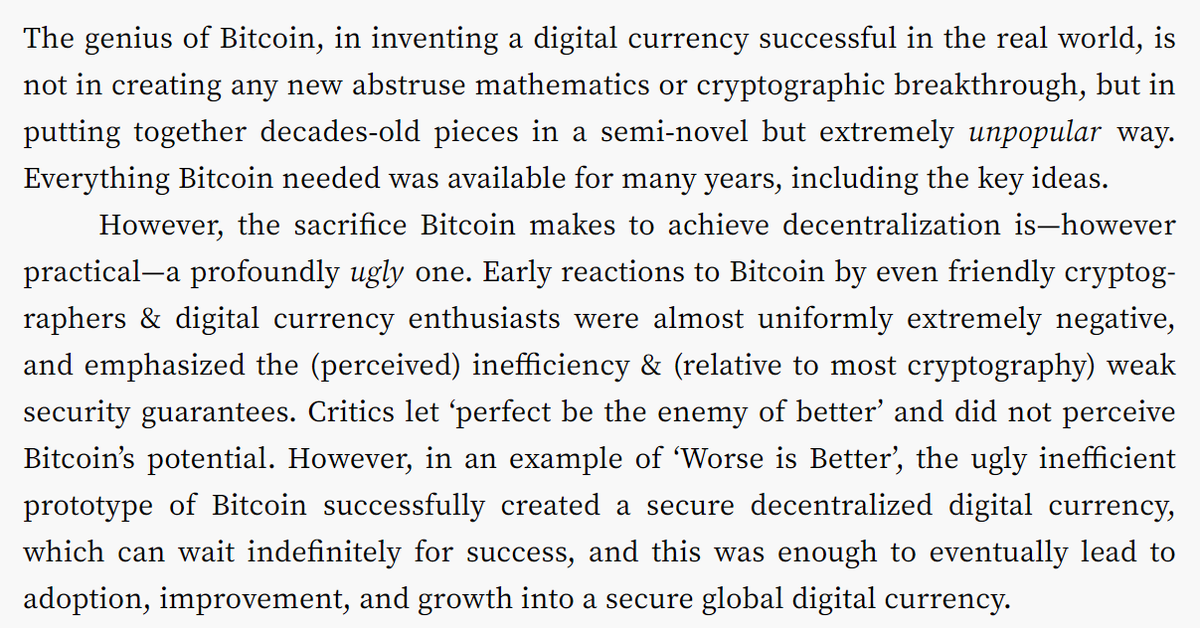
As to the risk of individual hacking, it is true that it is a problem but one that is rapidly being ameliorated with the development of technologies to more easily allow people to custody their own private keys. Do not doubt that tremendous innovation in this space will occur.
Firstly, I suggest you buy a hardware wallet and try it for yourself. What you will find is that while there is room for improvement in user-interfaces, large amounts of wealth can be custodied for *orders of magnitude* less cost than custodying the equivalent in gold.
This is not to mention the even greater savings that can be had in *transmitting* this wealth. The ability to custody cheaply is not a trivial comparative advantage. Nation-states such as Venezuela now understand the risks of having their gold in the hands of antagonistic states. 

The ease and cheapness of self-custody is now available to individuals. Once you have felt the power of being sovereign over your own savings (walking across borders without anyone knowing how much you're carrying) you will never go back.
You worry about privacy and the potential for nation-state attacks against #Bitcoin. Response in subsequent tweets. 
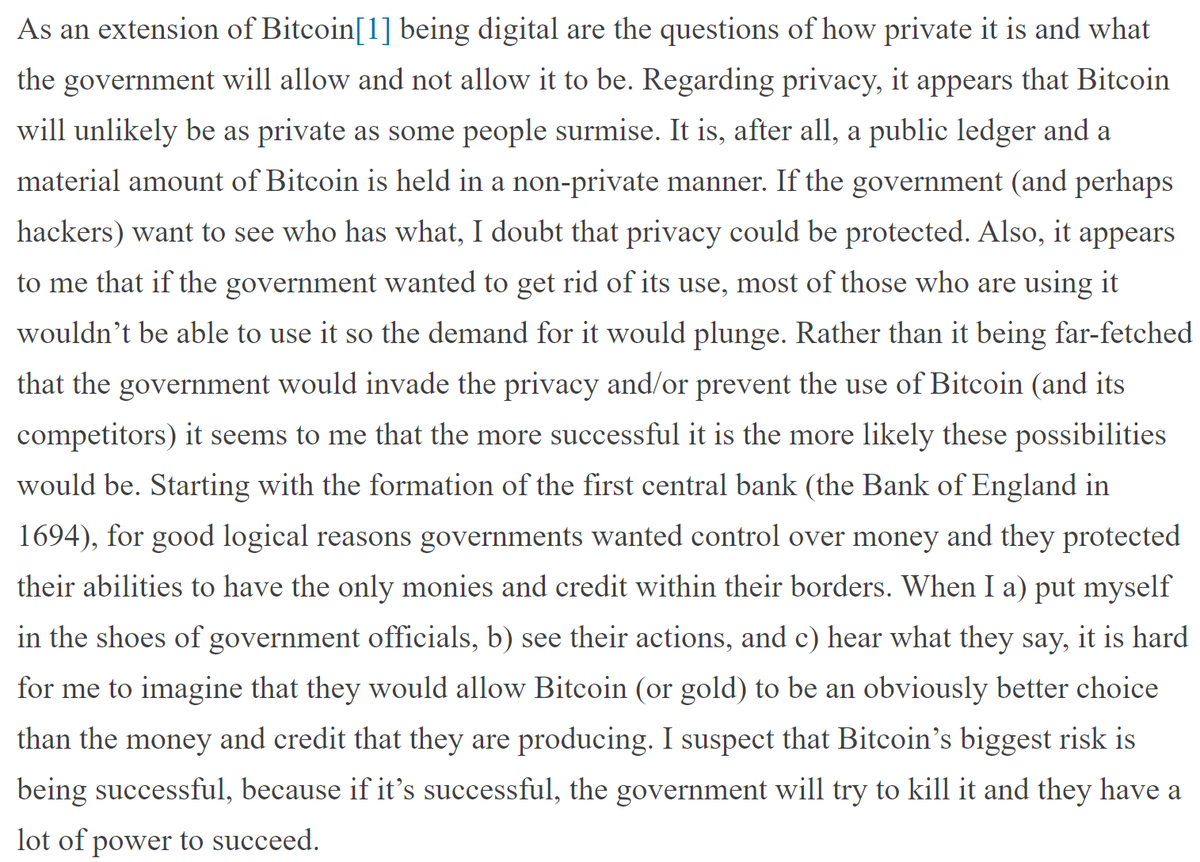
Privacy is certainly a legitimate concern for #Bitcoin. It is a pseudonymous system where all transactions are kept on a public record forever. However improvements to the protocol (such as Taproot) are coming and will improve Bitcoin's privacy. The lightning network also helps.
Regarding state-attack: Being decentralized in design, #Bitcoin has shown a remarkable degree of resilience in the face of numerous attempts by various governments to regulate it or shut it down.
However, the exchanges where bitcoins are traded for fiat currencies are highly centralized and susceptible to regulation and closure. Without these exchanges and the willingness of the banking system to do business with them, monetization of Bitcoin would be severely stunted.
While there are alternative sources of liquidity for Bitcoin, such as over-the-counter brokers and decentralized markets for buying and selling Bitcoins, the critical process of price discovery happens on the most liquid exchanges, which are all centralized.
Mitigating the risk of exchange shutdowns is jurisdictional arbitrage. Binance, a prominent exchange that started in China, moved to Japan after the Chinese government halted its operations in China.
National governments are also wary of smothering a nascent industry that may prove as consequential as the Internet, thereby ceding a tremendous competitive advantage to other nations.
Only with a coordinated global shutdown of #Bitcoin exchanges would the process of monetization be halted completely. The race is on for Bitcoin to become so widely adopted that a complete shutdown becomes as politically infeasible as a complete shutdown of the Internet.
It should be noted than in the Western democracies there is a kind of political capture happening with #Bitcoin somewhat reminiscent of the political capture that happened with Uber (where its users and contract workers became a natural lobby for it)
As the number of people who own #Bitcoin grows, the harder it will be for democratic nation-states to enact policies that would harm the savings of their citizenry. There are already several pro-Bitcoin members of the US Congress, such as the great Senator @SenLummis.
Some of this thread has been taken from my article The Bullish Case for Bitcoin, which covers this topic in much greater detail. I am happy to make myself available to discuss and debate these ideas in much more detail in private if you want to go down the rabbit hole (DM me).
You write: "That is why to me Bitcoin looks like a long-duration option on a highly unknown future that I could put an amount of money in that I wouldn’t mind losing about 80% of. "
In my article I agree with you:
In my article I agree with you:
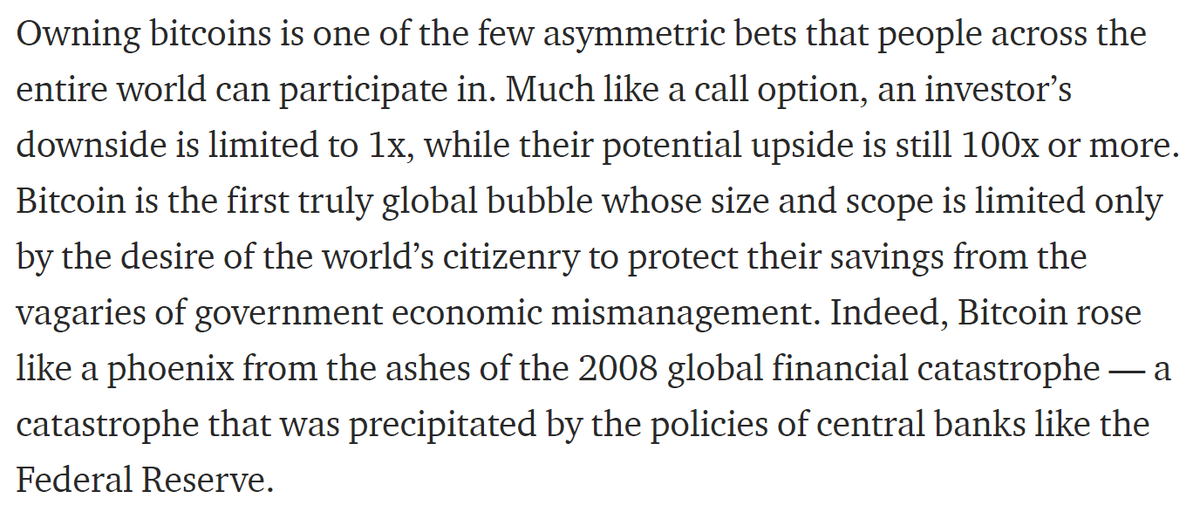
• • •
Missing some Tweet in this thread? You can try to
force a refresh
